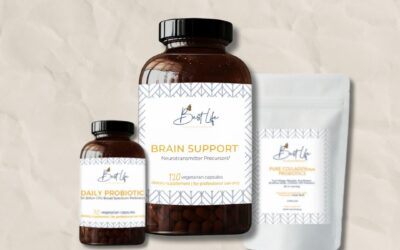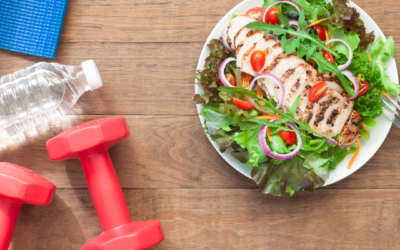The holidays are the perfect time to unwind and spend some much-needed time with friends and family, but they also happen to be loaded with sugar. From homemade baking to treats at the office, it is easy to overindulge. Thankfully, the new year is a perfect opportunity to start fresh and take a break from the sugar rush!
While the occasional holiday treat is fine, consistently overdoing it on sugar can have negative impacts on your overall health. Especially our gut and immune health! Studies have found that high-sugar diets can lead to poor gut health and lower the immune system (roughly 70% of your immune cells are found in the gut!)
Now is the time to become more mindful of what you consume and how it makes you feel. Every day is a new day and if your new year isn’t of to the best start that’s ok. Treat this month as a fresh start with our top tips for making 2024 a lower sugar year. You don’t have to be perfect, but small consistent actions lead to big changes in time. Just do the best you can. Keep reading to learn more!
Why Should You Avoid Too Much Sugar?
- Insulin Overproduction: Consuming sugar increases your blood sugar levels, which in turn causes your body to produce insulin. Insulin is a hormone produced by the pancreas that helps your body use sugar for energy. But what happens if you don’t end up using that sugar as fuel? It gets stored as fat so your body can use it later! Over time, repeatedly high blood sugar & insulin levels can have profound negative impacts on your health. Eventually, your body enters a vicious cycle of over-producing insulin and then storing everything as fat, potentially leading to chronic conditions such as obesity, fatty liver, and cardiovascular disease. Oh and here’s the thing. It’s impossible to lose weight when insulin is high and insulin resistance is a common cause of many chronic diseases. Insulin is rarely checked on routine bloodwork but if you are able to get it checked and ideal level is a fasting level of 4-8.
- Mood Disruptions: If you are active and have good metabolic health, your body can handle a blood-sugar spike every so often. But, you will likely still experience the “hangry” crash that follows. This abrupt drop in blood sugar levels after a spike can affect neurotransmitters like serotonin and dopamine, leading to mood swings and irritability.
- Hormone Imbalances: For women, a diet high in sugar can impact their hormones negatively. High levels of sugar can exacerbate uncomfortable menstrual symptoms like cramps, mood swings, fatigue, and bloating. High-sugar diets are also associated with polycystic ovary syndrome (PCOS), which is characterized by chronically high insulin levels, blood sugar dysfunction, and disrupted menstrual cycles.
Top Tips For A Sugar Cleanse
1 – Check ingredient labels and get creative in the kitchen
Avoiding the obvious culprits – cookies, and candies – is not always enough to prevent a major blood-sugar spike. Often, what we find on the shelves is full of hidden sugars and preservatives that don’t support our health. Added sugars are everywhere, from salad dressings and pasta sauces to yogurt.
We suggest reading ingredient labels carefully and making your own versions of grocery-store staples whenever possible. Homemade granola is super easy to make, as is homemade oatmeal with fruit, cinnamon, and a bit of natural sweetener (see below for some options). There are also plenty of recipes online for healthy, homemade salad dressings and pasta sauces that are made from whole food ingredients and limit sugar.
2 – Avoid drinking sugar
Speaking of hidden sugars, liquid sugar can subtly creep into our diets without much awareness. Flavored coffees and teas purchased from cafes or stores may contain added syrups or sweeteners. Starbucks is a dessert, my friend. Bottled smoothies can surprisingly harbor high levels of added sugars or fruit concentrates. Sports drinks, despite being marketed for hydration and energy replenishment, can contain notable amounts of added sugars, at times rivaling the sugar content in sodas. Similarly, flavored waters or vitamin-enhanced drinks might hide considerable sugars to enhance their taste. Alcoholic beverages, particularly cocktails and mixers, can pack a sugary punch. Even low sugar diet drinks are best to be avoided. Often these artificial sweeteners are worse than sugar! My rule of thumb when it comess to artificial sweeteners is if you can’t pronounce it your body may struggle to process it.
Consider switching to unsweetened herbal teas and black coffee or coffee with a bit of unsweetened cream or milk. Making homemade smoothies using whole fruits, vegetables, and unsweetened yogurt or milk provides control over sugar content while savoring natural sweetness. Opt for water infused with fresh fruits, herbs, or cucumber for a flavorful, sugar-free alternative.
3 – Stay hydrated
Often, we mistake dehydration for hunger, which can lead to intense sugar cravings. This only creates a vicious cycle though, as high-sugar foods trigger more dehydration.
Aim to drink at least 2-3 L ounces of water per day, and be sure to hydrate before meals to help stave off cravings. Individual hydration needs may differ, so it’s essential to adjust water intake based on personal factors, including activity levels and climate. Staying attuned to your body’s cues for thirst and ensuring regular intake of water throughout the day is key to maintaining proper hydration levels and reducing the likelihood of mistaking dehydration for sugar cravings.
4 – Eat healthy fats & protein at every meal
Breakfast is the most important meal of the day if you are trying to kick sugar – studies show that starting the day with healthy fats and protein helps to curb cravings later on in the day. Swap your usual toast & jam for an avocado and egg toast. And if you love oats, you can mix in a protein powder and some nut butter to keep you satiated for longer.
Be sure to apply this principle of healthy fats and protein to every other meal of the day, limiting simple carbohydrates and filling your plate with plenty of fibrous veggies. I frequently tell my patients carbs aren’t bad but carbs alone without protein or a healthy fat aren’t a great choice.
5 – Discover sugar substitutes
Substituting sugar in recipes with natural alternatives offers a healthier approach to sweetness.
Opting for pure maple syrup, honey, or date syrup not only adds sweetness but also introduces additional nutrients and antioxidants, enhancing the nutritional value of your dishes. Mashed fruit or applesauce serve as excellent sugar substitutes, lending natural sweetness while providing fiber and essential vitamins. Additionally, coconut sugar, derived from the sap of coconut blossoms, offers a low glycemic index, making it a favorable substitute for refined sugars while imparting a rich flavor profile to your recipes.
Understandably, each individual’s journey toward a healthier lifestyle is unique. Whether you seek guidance, motivation, or a customized plan, our expertise and commitment are geared toward assisting you in achieving your wellness goals this year. Reach out today our team is here to help!
Sources
Medical News Today, “Sugar disrupts microbiome and immune function, leading to metabolic disorders.” https://www.medicalnewstoday.com/articles/sugar-disrupts-microbiome-and-immune-function-leading-to-metabolic-disorders
Wiertsema SP, van Bergenhenegouwen J, Garssen J, Knippels LMJ. The Interplay between the Gut Microbiome and the Immune System in the Context of Infectious Diseases throughout Life and the Role of Nutrition in Optimizing Treatment Strategies. Nutrients. 2021; 13(3):886. https://doi.org/10.3390/nu13030886
Malik VS, Popkin BM, Bray GA, Després JP, Hu FB. Sugar-sweetened beverages, obesity, type 2 diabetes mellitus, and cardiovascular disease risk. Circulation. 2010 Mar 23;121(11):1356-64. doi: 10.1161/CIRCULATIONAHA.109.876185. PMID: 20308626; PMCID: PMC2862465.
Hashim MS, Obaideen AA, Jahrami HA, Radwan H, Hamad HJ, Owais AA, Alardah LG, Qiblawi S, Al-Yateem N, Faris MAE. Premenstrual Syndrome Is Associated with Dietary and Lifestyle Behaviors among University Students: A Cross-Sectional Study from Sharjah, UAE. Nutrients. 2019 Aug 17;11(8):1939. doi: 10.3390/nu11081939. PMID: 31426498; PMCID: PMC6723319.
Hajivandi, L., Noroozi, M., Mostafavi, F. et al. Food habits in overweight and obese adolescent girls with Polycystic ovary syndrome (PCOS): a qualitative study in Iran. BMC Pediatr 20, 277 (2020). https://doi.org/10.1186/s12887-020-02173-y
Ma X, Nan F, Liang H, Shu P, Fan X, Song X, Hou Y, Zhang D. Excessive intake of sugar: An accomplice of inflammation. Front Immunol. 2022 Aug 31;13:988481. doi: 10.3389/fimmu.2022.988481. PMID: 36119103; PMCID: PMC9471313.
Harvard School of Public Health, “Healthy fats help curb cravings for unhealthy carbs,” https://www.hsph.harvard.edu/news/hsph-in-the-news/food-cravings-carbohydrates/





